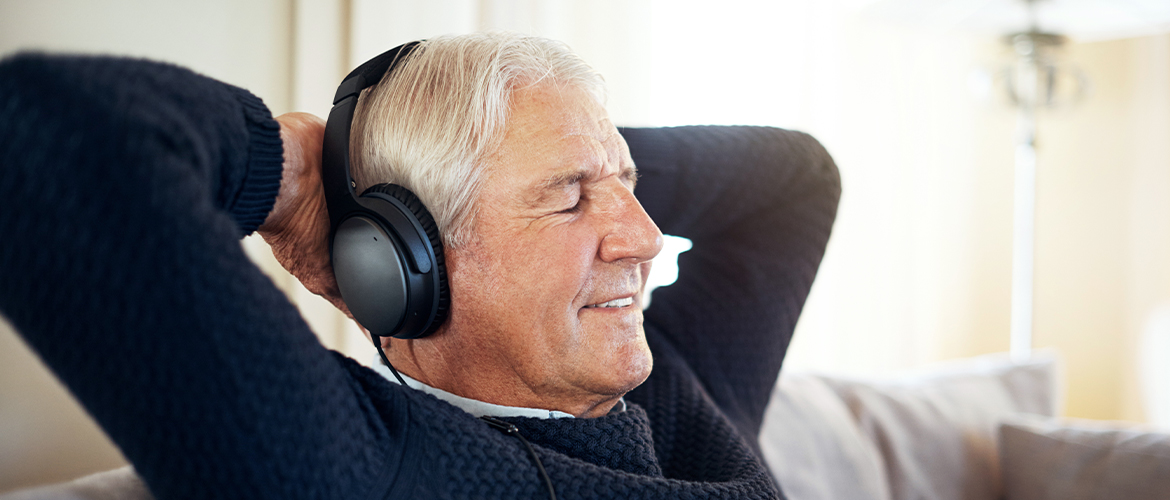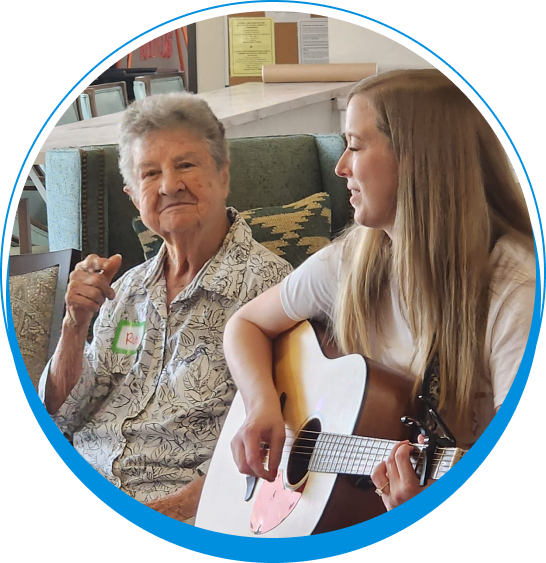By Cara Perkins, MS, MT-BC (HPMT)
Music has been described as the gateway to our soul – often evoking our deepest emotions, thoughts and memories. It has been proven to have powerful effects on the brain and brain function. And when used a therapeutic tool, it has been shown to boost brain health as well as improve memory recall. Due to this, music has been used for years in various occupational, medical and rehabilitative settings for patients of all ages – from pediatrics to geriatrics and more.
While music therapy is most effectively administered by a certified music therapist, there are many ways you can leverage the benefits of this tool as a caregiver.
Things to Consider When Leveraging Music
Singing, playing and analyzing music is a great way to stimulate your loved one mentally, physically, emotionally and socially. When exploring and sharing music with him/her, here are some things to consider:
- Musical selection should be reflective of his/her young adult years and life milestones. Select music that highlights his/her favorite singers/songwriters/musicians, genres, religious affiliations, musical background, etc.
- Tempo and rhythm can illicit different responses (e.g., slow rhythms produce a hypnotic effect while fast rhythms support the opposite). If you’re able to get a heart rate reading, try matching the song’s tempo or speed to his/her heartbeat, then gradually introduce songs with slower and slower tempos to encourage the heartbeat to slow.
- Instrumentation affects the emotions and physiology of the brain. Pay attention to how your loved one responds to certain instruments. Are certain instruments more distressing or peaceful to your loved one?
Additional musical elements to keep in mind:
- Volume – Impacts your brain with electrical pulses (e.g., loud volume can overstimulate the mind compared to a softer volume).
- Melody – A simple melody typically relaxes, while a complex melody typically stimulates.
- Pitch and Tone – Differences in voice and instruments can also impact responses and reactions from your loved one.
- Lyrics – Many can heal and support; however, some can also create stress and various emotional responses.
Ways to Engage Your Loved One With Music
- Books and other visual elements can provide more opportunities for cognition, decision-making and communication. Select a book they can sing along with and have them cue you to sing the song, turn the page or interact with the book.
- Home movies, personal recordings or videos of you, your loved one or others singing can motivate him/her to engage. Reminiscence over family videos featuring singing or dancing or create your own video/audio clips with a smartphone or hand-held recorder.
- Another form of cognitive engagement could be to have your loved one fill in the words to song lyrics. Or, spark conversation by asking simple questions correlating to the song (e.g., for the Hank Williams song “Hey, Good Looking,” you could ask, “What is a hot rod Ford?”)
- Simple songwriting exercises – like prompting your loved one to fill in different words to songs to make it their own – encourage creativity and self-expression. If your loved one finds speaking difficult, provide choices for them to point or respond “yes” or “no” to.
- Dancing, movement to songs or playing instruments can support daily living skills. For instance, provide a small hand drum and prompt your loved one to slide his/her hand with a repetitive washing motion as if washing the dishes.
- Interpersonal interactions can allow him/her to emotionally explore and connect with peers. Guide them in hand-over-hand dancing, facilitate group lyric analysis discussions or lead an improvisational drum circle.
James L. West incorporates music therapy daily into the lives of our residents, and is able to share benefits of music with the larger community through our Nina Maria Cole Music & Arts Fund. Want to know when the next dementia-friendly community concert is taking place? Contact us at 817-877-1199.


